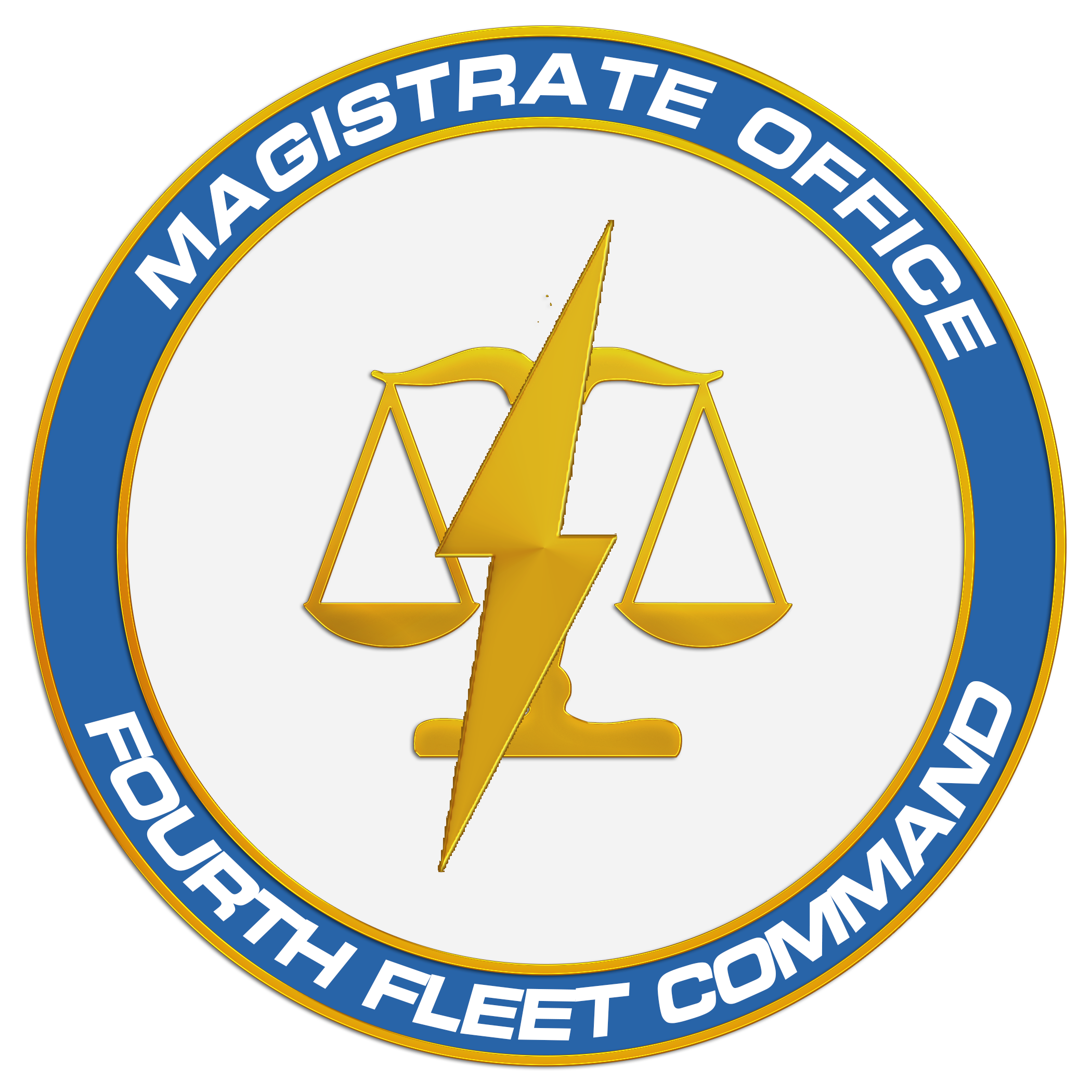Greetings members of Bravo Fleet,
As discussed in the recently amended Magistrate Opinion for Bravo Fleet v. Jack Pike (BFM-001), a lot of changes to the Bravo Fleet Magistrate Code and its evolution came from that case. The entire Magistrate Code was looked at from top to bottom, and a fundamental rewrite was completed thanks to the team of myself, our BFCO, BFXO, and Slagar. This amended Code was presented to the BFA, and unanimously passed.
I will preface by saying that many of these changes were to shift the Magistrate Code more firmly towards its intended rehabilitative approach than the perceived punitive approach. One example, for instance, was building in the ability and process for a Letter of Reprimand to be removed from a member who had completed a rehabilitative process and was a strong, active member of our organization with no further infractions.
I will also say that there has been some push back on even having a Magistrate system because we’re “just a club”. It’s an interesting side to take that there can’t be a system that makes members of a club responsible for their actions because it is “just a club” when, quite literally, every club has some type of system which holds its members accountable for their actions.
We also understand that this has increased the process and complexity by which the Magistrate’s Office operates. This is a feature, not a bug. The process is complex to restrain what the Magistrate can do to a member, not to restrain the member. There was a time in Bravo Fleet history when the process was much less complex, and under that process, there were 50 some odd members who were unilaterally banned from Bravo Fleet for such infractions as “cussing the BFCO” and “changing specs on sim without authorization”. Many of those bans stood for over a decade until this Magistrate process originally took effect in 2010 and the BFCO at the time, who is also the current BFCO, lifted all of those bans. We want to protect our members from that type of action being taken against them, therefore the judicial system must be robust to protect them.
There are a lot of changes, but I’d like to go through each section, its changes, and the thought process behind the changes. We’d also like to stress that we tried to keep it in a format that still read as an almost step-by-step guide for how the process works and hopefully accomplished that.
The first big change is that Article VI of the Charter was ported over to be Section 1 – The Magistrate Corps and Section 2 – the Rights of the Accused of the Magistrate Code. This change was merely to have all Magistrate process things in one place, including the appointment of the Magistrate’s Office staff and the rights of those accused under it. The Rights of the Accused were also beefed up to afford our membership a more clear and concise vision of what we want the Magistrate Code to represent. The biggest change is that members now have a right to know what charges are being laid against them, a summary of the facts, and the penalties that the Investigator is seeking before they plead. We felt strongly that this helps someone accused to make a more informative decision; we hope that with this information, the accused can work with the Magistrate’s Office to begin the steps of rehabilitation.
Section 3 – The Process of Adjudication was also highly revised to reflect this. Including the aforementioned process of informing the accused what charges are being laid against them, a summary of the facts, and the penalties that the Investigator is seeking, there are several other big changes. One is that a Statute of Repose was added limited at six (6) months; this was to close a loophole where the Magistrate could technically sit on charges in perpetuity and charge the accused many years later. Mixed with the existing Statute of Limitations, the range from discovery of infraction to charging the accused is no more than one (1) year. There is also a clarification about the pleas, what happens with each one, how long someone has to enter a plea, and more importantly from the above referenced case what happens if a plea is not entered. There is also a major change to what triggers a Trial by Magistrate and a Trial by Jury, mostly centered around the idea of what the penalties being sought are. The idea is that we didn’t want this to seem like a real court room with a full blown jury unless the penalty was going to be severe. Otherwise, most cases will fall under the Trial by Magistrate. We also bolstered this section with actual rules of evidence and what can and cannot be used to try and limit the evidence to what is reasonably ascertainable in an internet club.
Section 4 – Juries were relatively untouched with the exception of a provision for the medium of deliberation. This was originally a forum, but as we’re now in 2020 and we have mediums like Discord, this was amended appropriately.
Section 5 – Appeals Panel was updated to reflect a more accused friendly scope. Appeals now have a standard of review where they are not only reviewing the procedural aspects of the case but also if those aspects actually affected the outcome of the proceedings. The process after an appeal, successful or unsuccessful, has been updated due to lessons learned from the above mentioned case to keep the process from getting stuck in a perpetual loop.
Section 6 – Specific Article of Conduct and Reprimand was altered slightly due to feedback. The spirit of the former Mutiny and Sedition provision was rolled into Abuse of Power and reworded to be more reflective of someone who has used their position to harm others or Bravo Fleet. We also bolstered Disreputable Behavior as well as renaming Hacking to Unauthorized Access and redescribing that to be more apt. Violations of Fleet Policies was also added and is relatively self explanatory.
Section 7 – Penalties was also completely rewritten to be more specific about the types of penalties one could expect. Some were added, some were dropped, some were expanded upon. The big takeaway from this section is actually that we separated penalties into Judicial (so, Magistrate) and Executive (the BFA). Judicial penalties are much more long lasting and far reaching and require a trial. The executive penalties are, believe it or not, there to try and avoid a Magistrate trial at all costs. A good example of this might be an Activity Ban in the gaming sector of our operations; say someone is pushing the rules to their advantage and it might be a good idea to give them a slap on the wrist to let them know it isn’t okay. What makes more sense: a two week ban from submitting gaming activities for gaming awards, or the whole song and dance of a Magistrate trial for cheating? Executive penalties are also short; the Activity Ban can be no longer than one month, for instance. So they’re just short little ways of us hoping to avoid the Magistrate for members who may misbehave, but still helps to rehabilitate and correct their actions. All Executive penalties must also be reviewed by the Magistrate or Appeals Panel, so an extra layer of checks and balances exists.
This is also the section that we highlight the Letter of Reprimand can be removed. I will simply highlight that section here verbatim:
- Letters of Reprimand: As a Judicial Penalty, the Magistrate has the authority to issue a Letter of Reprimand to a member. They are generally issued with any conviction by the Office of the Magistrate and signify that the member has violated the rules of the Fleet to such a degree that their record should be marred. The Magistrate may, upon application of the member and for good cause shown, expunge a Letter of Reprimand from a member’s dossier if the following criteria are met:
- the Magistrate determines that the member has been completely rehabilitated;
- at least two years have passed; and
- the Magistrate and the Bravo Fleet Commanding Officer agree that there is no future benefit to having a public reference on the member’s dossier.
Hopefully this helps highlight how seriously we take the corrective action and rehabilitative approach!
Section 8 – Order of Advanced Incarceration is untouched, and is still mostly a BF-saving emergency power.
Section 9 – Removal of a Member from a Unit was a section added to remove members who are causing problems in their unit, but may find a home elsewhere. There are certainly specific times in Bravo Fleet history where personalities clash, but when members are shuffled around they flourish again. That is what we hope this will accomplish if and when it is used. The section reads more like a step by step guide, but is hopefully informative and used to positive effect.
Section 10 – Amendment is unchanged.
All in all we hope that this will bring about a more positive system that avoids trials at all costs, softens our language a bit, holds the Magistrate more accountable, and leaves less room for interpretation and forces the Magistrate’s Office into a more concrete structure to protect our members from any possibility of an unconstrained Magistrate. Of course this is a major overhaul of the system as it was, so if there are any questions, comments, or concerns feel free to either reach out by email or in #ask-the-bfa on Discord!
Live Long and Prosper,


 Bravo Fleet
Bravo Fleet









